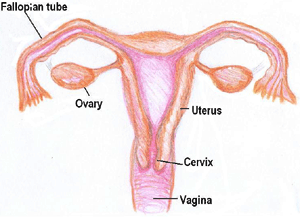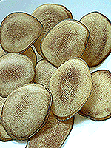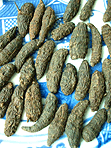Characteristics of Gynecological Treatment in TCM
 |
Female Reproductive System |
TCM has abundant experience in treating women's diseases, which includes various approaches and flexible applications.
Treatment based on syndrome differentiation is one of the main principles of Chinese medicine. The therapeutic effects of TCM depend greatly on it. Under normal circumstances, TCM diagnoses do not follow standard Western pathological classifications of disease, but rely on a complex pattern of signs and symptoms that manifest at a given stage of the disease. Physicians should first determine at which stage the disease has developed, its location, and the degree of opposing forces between the body resistance and the pathogenic factors. Therefore, therapies are typically individualized according to the imbalance of the body measured by various parameters including yin, yang, qi (vital energy), blood and body fluids. Alleviation of these symptoms usually reflects that the patient's body has returned to a new balanced state. See article on " Principles of Diagnosis."
In TCM gynecological treatment, regulating menstruation ranks the highest priority. The famous classic Nuke Jinglun (Principles of Obstetrics and Gynecology) states: "Under-functioning in the organs or disharmony of qi and blood damages the Thoroughfare Vessel, Conception Vessel, Governor Vessel and Girdling Vessel respectively, which leads to different gynecological diseases. For this reason, nourishing the kidneys, regulating the liver, invigorating the spleen and stomach and harmonizing the blood and qi (vital energy) are important methods for relevant treatments."
| 1. |
Nourishing the Kidneys: |
 |
Pilose antler slices (Cornu Cervi Panotrichum) |
In TCM, the kidneys are regarded as the "congenital foundation". They dominate the growth, development and reproduction of the body. The abundance and exuberance of kidney essence promotes tian-gui formation; therefore, when activities in the Thoroughfare Vessel and Conception Vessel are enhanced, the uterus can be nourished by abundant qi and blood and menstruation is ensured. This is the most important principle of TCM women specialties. Pilose antler is usually used in kidney yang tonics. |
| 2. |
Regulating the Liver: |
 |
Nut grass
(Rhizome Cyperi) |
The liver stores blood. It regulates the volume of blood circulating in the body according to the needs of various organs. The liver also controls the smooth flow of qi; blood needs qi to move. Therefore, it greatly influences the function of the uterus; a normally functioning liver promotes blood and qi flow in the Thoroughfare Vessel and Conception Vessel. When the flow of blood and qi in the two vessels are smooth, disorders in menstruation or vaginal discharge can be avoided. Nut grass is commonly seen in the prescriptions for regulating the liver. |
| 3. |
Invigorating the Spleen and Stomach: |
 |
Largehead Atractylodes Rhizome
(Rhizoma Atractylodis Macrocephalae) |
The spleen and stomach are the main organs of the digestive system. They perform the transformation and transportation processes that provide nutrient essence for blood and qi production. The spleen also keeps blood circulating within the blood vessels. In case of a spleen deficiency, the Thoroughfare and Conception Vessels lose their consolidation functions, and the Girdling Vessel fails to perform its retaining property. As a result, the female reproductive system is affected, especially in elderly women as they already have declined in kidney essence, qi and blood. Normal supplies of nutrient essence from the spleen and stomach are thus crucial. Largehead Atractylodes rhizome is a common ingredient in the prescriptions. |
| 4. |
Harmonizing the Blood and Qi: |
 |
Chinese angelica root (Radix Angelicae Sinensis) |
The primary component of menstruation is blood; hence there is the saying "women take blood as primary." Moreover, blood flow is dominated by qi (vital energy) movement. A smooth flow of blood and qi means the organs are harmonious and the uterus vessels are properly regulated; therefore menstruation and other functions are normal. The roots of Chinese angelica are commonly used as blood tonics. |
In conclusion, TCM has been successfully employed for treating all kinds of women's health problems. Its treatment modalities have two major types: medicinal and non-medicinal. The two types are mutually coordinated and benefit each other to provide holistic and comprehensive treatments internally or externally. In medicinal administration, the physician will notice the variations in the body's yin, yang, blood and qi so as to choose the correct herbs for proper treatment. TCM herbal combinations are very individualized according to the patient's make up and practitioners experience with various herbs. Non-medicinal modalities commonly used include acupuncture, moxibustion, massage, cupping, scraping, hot compression, fumigation and washing, qigong and lifestyle modification.
Today, we are living in a society very interested in taking control of our own health preservation. TCM has a long history with natural health products, which are specially prepared for nourishment, immune boosting, regeneration, weight loss or beauty proposes. Their natural approach contrasts with most modern synthesized products and thus these products typically have mild or no adverse effects making them safer alternative choices.
|